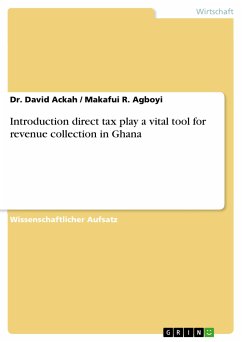Wissenschaftlicher Aufsatz aus dem Jahr 2014 im Fachbereich VWL - Geldtheorie, Geldpolitik, , Sprache: Deutsch, Abstract: The introduction of direct tax has been a vital tool for revenue collection in Ghana. This study reveals that, revenue acquired from this type of tax is considered very crucial in the development of the country, hence a major source of revenue to the government. Direct tax was introduced in Ghana to subject the assessable income of income earners to tax, but unfortunately in Ghana, the collection of tax is confronted with numerous problems and thus tax evasion, tax avoidance, improper books of account, non-compliance of tax laws and inadequate logistics. This research therefore aims at evaluating the effectiveness of direct tax administration in the informal sector in Ghana. Questionnaires were administered to five (5) staff members of the Internal Revenue Service (IRS) and twenty-five (25) to the traders of the Abossey Okai environs. A simple sampling technique was used to aid in the selection of respondents. Responses from the IRS staff and the traders of the Abossey Okai environs were tabulated and analyzed. The study finds out that the traders in Abossey Okai are ignorant about what direct tax is about. However one major recommendation is for IRS to make it their priority to embark on educational programs for the traders in the Abossey Okai environs in order to enhance the effectiveness of direct tax administration in the informal sector in Ghana.
Bitte wählen Sie Ihr Anliegen aus.
Rechnungen
Retourenschein anfordern
Bestellstatus
Storno









